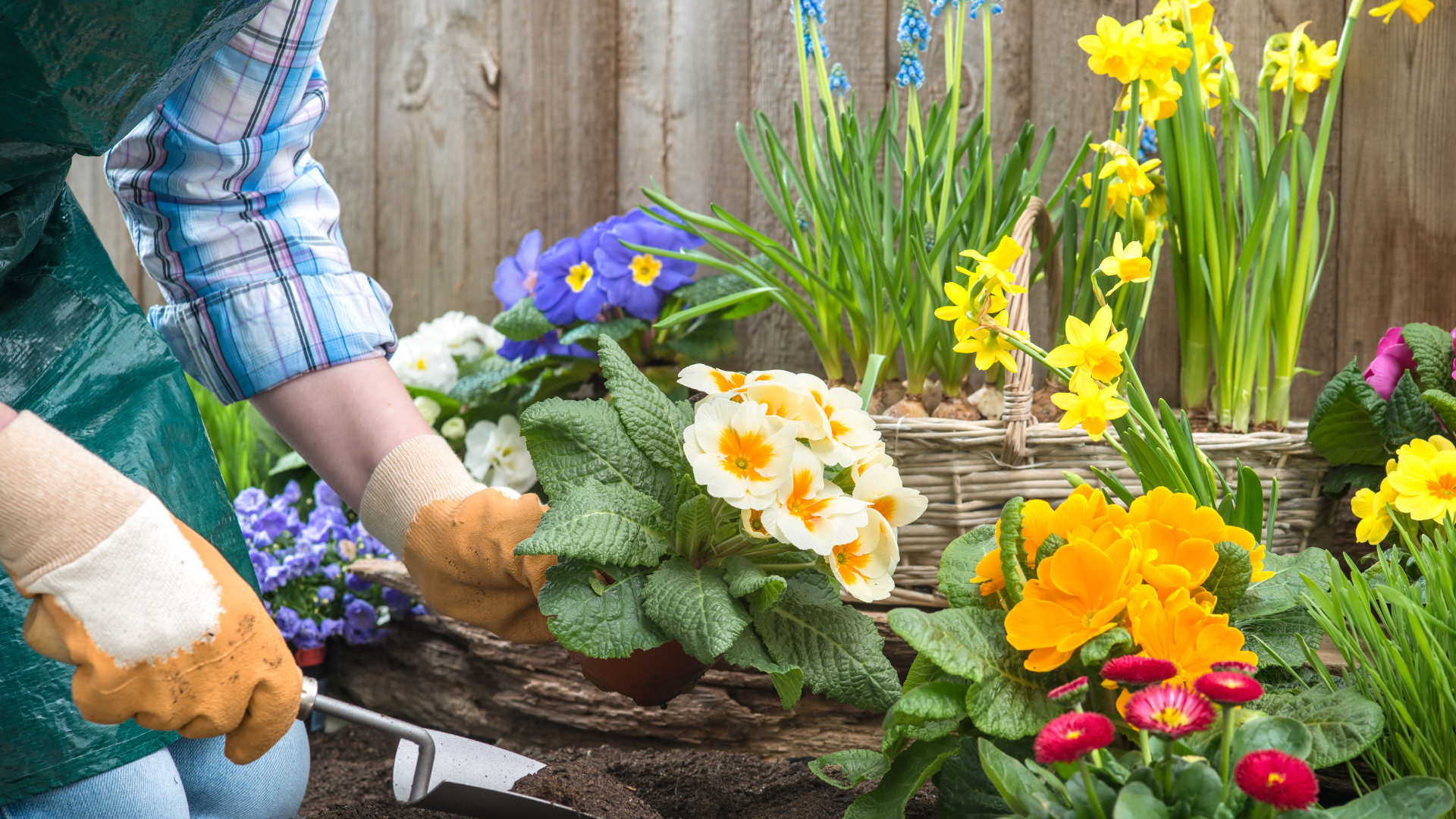Greening Your Space: From Balconies to Backyards
Whether you have a small apartment balcony or a sprawling yard, you can add green to any space. Start by planning a course of action, and with these tips, you can have your garden flourishing in no time.
-
-
- Clean up your yard: Before diving into garden planning, it’s important to set the stage for success by prepping your yard. This includes traditional tasks like raking leaves and clearing away debris, especially depending on where you live. However, consider the benefits of leaving some leaves in place. They can serve as habitat for beneficial insects and wildlife, contribute to soil health when decomposed, and act as natural mulch to retain moisture and suppress weeds. Be mindful of potential animal nests nestled within leaf litter. While tidying up, remember that old garden hoses aren’t recyclable and should be disposed of responsibly.
-
-
-
- Compost: Compost completes the loop by increasing organic matter in the soil, which aids in retaining soil moisture and supporting the healthy growth of plants, trees, and vegetable crops. There are various options available for purchase online, including both indoor and outdoor compost bins. You can even begin your composting journey with a water bottle. Click here for a tutorial on composting in a bottle.
-
-
-
- Reuse: Certain types of organic kitchen waste, such as coffee grounds, can supply essential nutrients that your soil requires. Mixing coffee grounds into your soil can help balance its alkalinity, repel pests like slugs and snails, and serve as a delightful treat for earthworms. Additionally, banana peels are an excellent source of potassium, promoting the growth of healthy and beautiful roses. Simply cut up the peels and place them around the base of your plant – no need to compost them first. Furthermore, eggshells can be washed and crushed to provide calcium for roses; mix them slightly into the soil or add them to compost for a calcium boost. To combat weeds, you can utilize corrugated cardboard by laying it over the soil and covering it with mulch. This practice not only suppresses weeds but also helps retain moisture in the soil.
-
-
-
- Test your soil: Understanding the soil type, its quality, and pH balance is crucial. Conducting a simple test can assist in identifying which plants are best suited for your soil. Your soil type and geographical location dictate which native species will flourish and which plants can withstand the common weather patterns in your region.
-
-
-
- Start small: If you’re new to gardening or live in an urban environment with limited space, gardening might seem daunting or even impossible. However, by starting small and planting in a container, creating a window box with herbs, or establishing a vertical garden on your balcony, you can effortlessly introduce greenery into any space. Regardless of size, ensure your plants receive adequate sunlight throughout the day. If you’re new to gardening, reach out to your local nursery or garden center to learn about “planting right” – putting the right plant in the right place at the right time.
-
-
-
- Plant native species: Native species, including trees, shrubs, and wildflowers, play a critical role in enhancing biodiversity, rebuilding ecosystems, and supporting pollinator health. For example, native trees not only benefit local wildlife but also help moderate ground temperatures and remove carbon dioxide from the air. Native species are hardy, low maintenance, and require less water than other species. They also adapt well to the growing conditions necessary to thrive in various climates and can withstand the unique weather patterns of each region. Be sure to research native species for your area and follow the USDA zone guidelines. Click here to learn more about native planting and to find your local Native Plant Society. Click here to learn more about native planting and to find your local Native Plant Society.
-
-
-
- Grow your own food: Now is the perfect time to consider planting fruits and vegetables at home. Growing food at home could not only help you reduce trips to the grocery store but also provide some much-needed stress relief. If starting from seeds, remember that they don’t necessarily need to be organic; what matters most is the growing technique.
-
Green spaces restore our communities, making them more environmentally healthy, socially connected, and economically vibrant. Gardens not only beautify our landscapes—they also help sequester carbon, reduce pollution, and prevent erosion. Gardening is a powerful way to improve physical health, boost mental well-being, and reconnect with nature.
This spring, take action! Join the Greatest American Cleanup and pledge to create vibrant spaces that keep your community looking beautiful. Every garden planted and green space cared for makes a difference. Let’s grow something good together.
Click HERE to learn more about the Greatest American Cleanup and make your pledge to help beautify your community today.
About Keep America Beautiful®:
Keep America Beautiful®, the nation’s leading community improvement nonprofit organization, inspires and educates people to take action every day to improve and beautify their community environment. Established in 1953, Keep America Beautiful® strives to End Littering, Improve Recycling, and Beautify America’s Communities. We believe everyone has a right to live in a clean, green, and beautiful community, and shares a responsibility to contribute to that vision. The organization is driven by the work and passion of 700 Keep America Beautiful® affiliates, millions of volunteers, and the collaborative support of corporate partners, social and civic service organizations, academia, municipalities, elected officials, and individuals. Join us on Facebook, Instagram, Twitter, Linkedin, and YouTube. Donate and take action at kab.org.
MEDIA CONTACTS:
McCall Vrydaghs
Keep America Beautiful®

